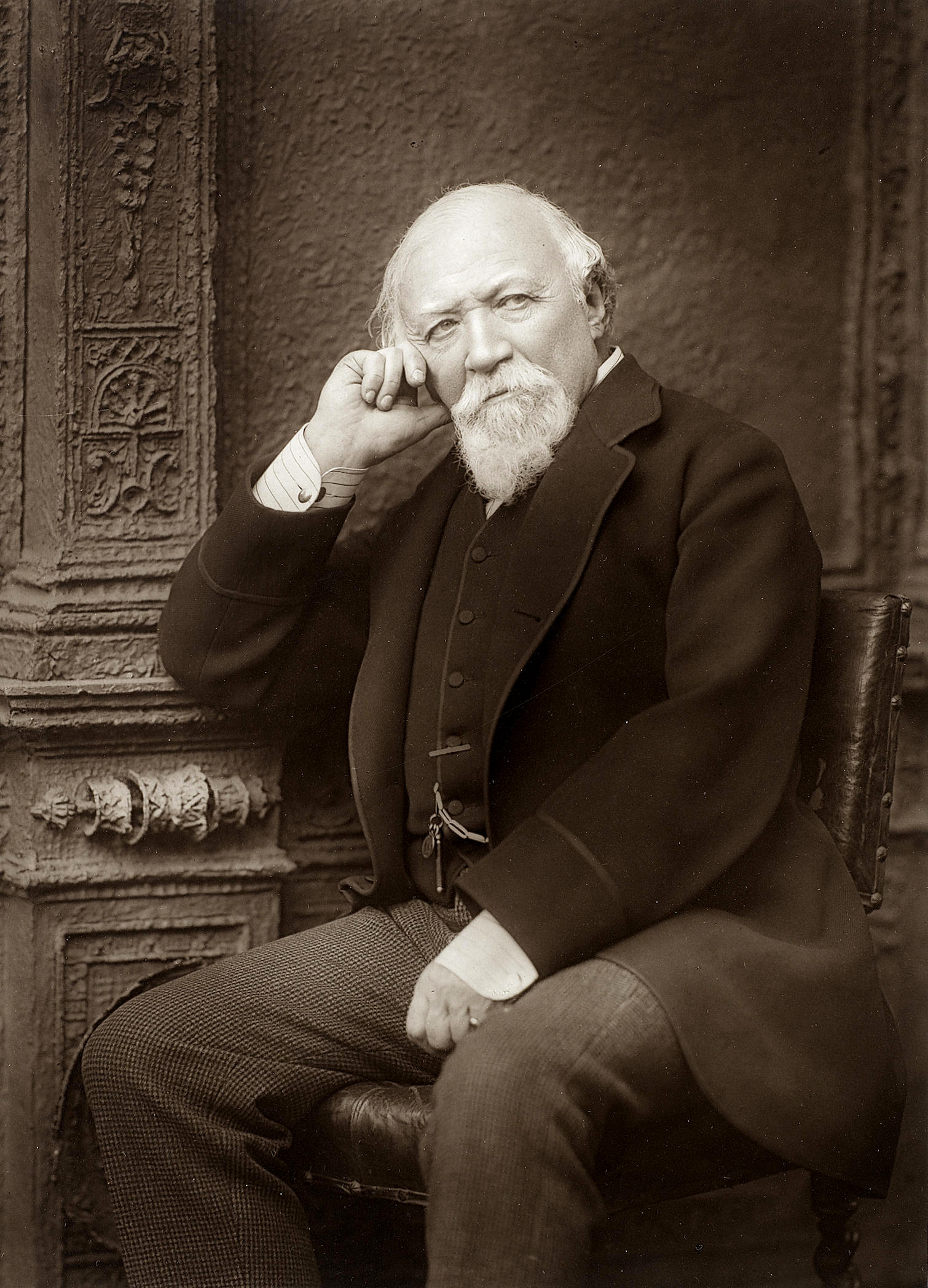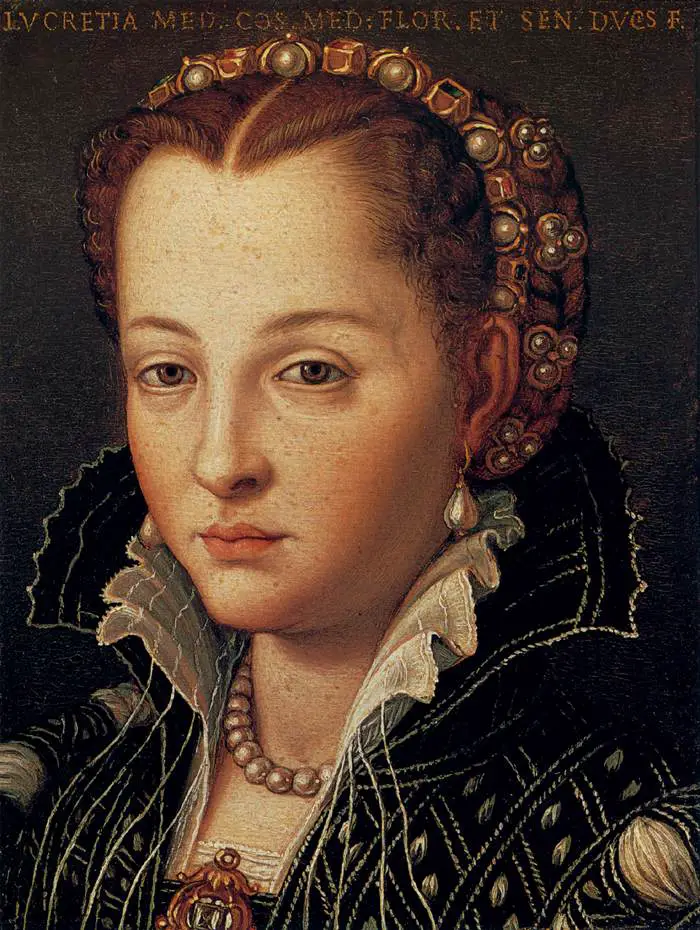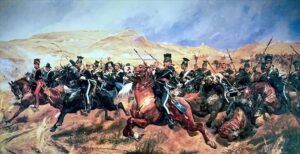
FULL POEM - SCROLL DOWN FOR LINE-BY-LINE ANALYSIS
That’s my last Duchess painted on the wall,
Looking as if she were alive. I call
That piece a wonder, now; Fra Pandolf’s hands
Worked busily a day, and there she stands.
Will’t please you sit and look at her? I said
“Fra Pandolf” by design, for never read
Strangers like you that pictured countenance,
The depth and passion of its earnest glance,
But to myself they turned (since none puts by
The curtain I have drawn for you, but I)
And seemed as they would ask me, if they durst,
How such a glance came there; so, not the first
Are you to turn and ask thus. Sir, ’twas not
Her husband’s presence only, called that spot
Of joy into the Duchess’ cheek; perhaps
Fra Pandolf chanced to say, “Her mantle laps
Over my lady’s wrist too much,” or “Paint
Must never hope to reproduce the faint
Half-flush that dies along her throat.” Such stuff
Was courtesy, she thought, and cause enough
For calling up that spot of joy. She had
A heart—how shall I say?— too soon made glad,
Too easily impressed; she liked whate’er
She looked on, and her looks went everywhere.
Sir, ’twas all one! My favour at her breast,
The dropping of the daylight in the West,
The bough of cherries some officious fool
Broke in the orchard for her, the white mule
She rode with round the terrace—all and each
Would draw from her alike the approving speech,
Or blush, at least. She thanked men—good! but thanked
Somehow—I know not how—as if she ranked
My gift of a nine-hundred-years-old name
With anybody’s gift. Who’d stoop to blame
This sort of trifling? Even had you skill
In speech—which I have not—to make your will
Quite clear to such an one, and say, “Just this
Or that in you disgusts me; here you miss,
Or there exceed the mark”—and if she let
Herself be lessoned so, nor plainly set
Her wits to yours, forsooth, and made excuse—
E’en then would be some stooping; and I choose
Never to stoop. Oh, sir, she smiled, no doubt,
Whene’er I passed her; but who passed without
Much the same smile? This grew; I gave commands;
Then all smiles stopped together. There she stands
As if alive. Will’t please you rise? We’ll meet
The company below, then. I repeat,
The Count your master’s known munificence
Is ample warrant that no just pretense
Of mine for dowry will be disallowed;
Though his fair daughter’s self, as I avowed
At starting, is my object. Nay, we’ll go
Together down, sir. Notice Neptune, though,
Taming a sea-horse, thought a rarity,
Which Claus of Innsbruck cast in bronze for me!

LINE-BY-LINE ANALYSIS
STANZA 1
That’s my last Duchess painted on the wall,
The poem starts with the duke showing a guest a painting of his former (why is she former) wife on the wall. Language-wise ‘my’ immediately conveys the controlling, possessive nature of the duke.
Looking as if she were alive. I call
This can be viewed as praise of the picture but the fact that it looks ‘as if she were alive’ implies she is dead and this becomes more sinister as the poem continues.
That piece a wonder, now; Fra Pandolf’s hands
Here the duke describes the painting as a ‘wonder’, however, this may also be interpreted as objectifying his former wife. Fra Pandolf is the artist of the picture.
Worked busily a day, and there she stands.
The duke has name-dropped this artist on purpose and is keen to say that he ‘worked busily’ on it. This suggests he values the painting not because of its depiction by his wife but due to the man that painted it and its value as a result.
Will’t please you sit and look at her? I said
The duke asks his guest if he’d sit down and look at the painting – one could comment that it is a rhetorical question and more of a command which adds to his controlling nature but his use of ‘please’ keeps this obscure.
“Fra Pandolf” by design, for never read
Strangers like you that pictured countenance,
The depth and passion of its earnest glance,
But to myself they turned (since none puts by
In these 4 lines, the Duke says that he name-dropped Fra Pandolf on purpose because strangers comment on the passion and depiction of her facial expression and ask him which painter can capture its ‘depth’ and ‘passion’ in such a fine way.
The curtain I have drawn for you, but I)
A very significant, perhaps sinister, aspect of this poem is contained within this parenthesis as the reader learns that the painting is covered by a ‘curtain’ which only the Duke is allowed to open. This is significant as, as he later explains, during her lifetime he could not control who she interacted with and made her happy but now his way of controlling her is by covering the portrait with a curtain. This controlling behaviour is sinister and makes us wonder if he was involved in her death, maybe covering the painting as a symptom of guilt.
And seemed as they would ask me, if they durst,
‘If they durst’ simply means ‘if they dared’ and it hints at the intimidating nature of the duke suggesting that his controlling nature is visible to those around him. As the poem goes on we begin to see the duke in an increasingly sinister light.
How such a glance came there; so, not the first
Many people have asked this question and it seems like the Duke is frustrated at all this attention his wife is receiving – something the curtain is designed to avoid.
Are you to turn and ask thus. Sir, ’twas not
Her husband’s presence only, called that spot
Of joy into the Duchess’ cheek; perhaps
Here, the Duke describes that he wasn’t the only man who could lead to the Duchess having a ‘spot of joy’ (blushing) on her cheek. This insinuates that other men flirted with and aroused the Duchess as ‘blushing’ is associated with flirting and shyness. This hints at the Duke’s unfaithful, slutty perception of her – in this day and age reason enough for him to get rid of her.
Fra Pandolf chanced to say, “Her mantle laps
Over my lady’s wrist too much,” or “Paint
Must never hope to reproduce the faint
Half-flush that dies along her throat.” Such stuff
These 4 lines recall the Duke observing Fra Pandolf asking the Duchess to move the shawl she wore so it would stop covering her ‘wrist too much’. We learn that during this moment and throughout her portrait she was blushing (‘the faint Half-flush that dies along her throat’. Again, we learn how the Duke feels that her blushing is a visualisation of her faults of being too easily aroused or impressed. Browning’s use of the word ‘die’ quickly darkens the tone and perhaps is foreshadowing what actually happens to her.
Was courtesy, she thought, and cause enough
For calling up that spot of joy. She had
The Duke says that the Duchess interpreted Fra Pandolf’s compliments as means enough to blush. This is a metaphor for the Duchess being sexually aroused too easily, hence, the Duke is portraying her as overly-sexualised – another repeated criticism of her.
A heart—how shall I say?— too soon made glad,
This is a further criticism of the Duchess having a ‘heart too soon made glad’. This phrase very much reiterates his previous complaints that she is overly impressed and entertained, especially by men. The rhetorical question is also very significant as it is an example of euphemistic language which is an attempt by the Duke to hide his controlling nature and disdain towards her and convey indecision about him which lessens the emotion in the words and his speech.
Too easily impressed; she liked whate’er
She looked on, and her looks went everywhere.
This describes the Duchess as liking everything she saw. The fact that ‘her looks went everywhere’ is the Duke’s attempts to convey her unfaithfulness and his experiences of this almost act as a justification to him for how and why he got rid of her. It also portrays how her natural independence and inquisitiveness juxtaposes his ideal perception of a wife.
Sir, ’twas all one! My favour at her breast,
The ‘favour at her breast’ is a piece of jewellery the Duke had gifted her. The fact the jewellery is worn near or around ‘her breasts’ adds sexual undertones which link to her unfaithfulness which he has previously implied.
The dropping of the daylight in the West,
This is the imagery of the sunset and can be seen as a pathetic fallacy and foreshadowing of her life coming to an end, just as the day does during sunset.
The bough of cherries some officious fool
The ‘bough of cherries’ is a gift to her from ‘some officious fool’ which means an enthusiastic random man, who by the Duke’s condescending language, is of status lower than theirs.
Broke in the orchard for her, the white mule
The white mule is the offspring of a donkey and horse. A ‘mule’ is typically sterile. This connotation of infertility is significant – on a basic level, it could symbolise the Duchess’s infertility which, if true, would definitely lead to her being rejected by the Duke.
She rode with round the terrace—all and each
Would draw from her alike the approving speech,
This explains how all of the things that the Duke has listed in the previous 4 lines all seem to give the Duchess equal satisfaction. This angers him – he feels outraged that she could see his gift of jewellery as comparable to a bunch of cherries.
Or blush, at least. She thanked men—good! but thanked
The image of ‘blushing’ is repeated again and is the key symbol of the poem. Its main symbolisation is one of flirtation and arousal and it is consistently used unfairly in a very negative context by the Duke.
Somehow—I know not how—as if she ranked
The caesura of the dashes creates a pause in the speech of the Duke. These pauses are an attempt to shield the extent of his anger at the Duchess as, by pausing, it makes it seem less like a continuous flow of anger and more of a calm appraisal of her weaknesses.
My gift of a nine-hundred-years-old name
By marrying her, the Duchess has adopted the surname of the Duke and the Duke describes this and the honour and respect that goes with his long-standing, high-class family as a gift to her that she should be grateful and in his debt for. However, the Duke is again frustrated by how she doesn’t ‘rank’ what he views to be the ultimate gift above everything else. We also learn that status and respect are very important qualities for the Duke.
With anybody’s gift. Who’d stoop to blame
This sort of trifling? Even had you skill
The Duke is irritated and ashamed of his wife and says that he will not ‘stoop’ down to her level. This strongly suggests that the Duke views himself above the Duchess; hence, there is a power imbalance in their marriage which mirrors the patriarchy at the time.
In speech—which I have not—to make your will
Quite clear to such an one, and say, “Just this
The Duke states that he is unable not to ‘stoop’ to the lower ethical class of his wife in a conversation about the weaknesses he perceives her to have without sounding ‘trifling’ even if with impeccable language – which he claims he doesn’t have. This is a hint of modesty in the persona of the Duke which we previously thought to be consumed by arrogance.
Or that in you disgusts me; here you miss,
‘Just this or that’ sets a very light-hearted, unserious tone to start this speech which juxtaposes and emphasises the extreme word choice ‘disgusts’.
Or there exceed the mark”—and if she let
‘Exceed the mark’ implies that the Duke (and society as a whole at the time) had pre-conceived ideas of what was allowed or what was ‘exceeding the mark’ from their wives. The Duchess is breaking the rules and, naturally, punishment will ensue.
Herself be lessoned so, nor plainly set
Her wits to yours, forsooth, and made excuse—
E’en then would be some stooping; and I choose
These 3 lines simply mean that even if she is talked to and educated on her wrongdoing this conversation would mean the Duke is sill ‘stooping’ to her level.
Never to stoop. Oh, sir, she smiled, no doubt,
The Duke chooses ‘never to stoop’ and he doesn’t see how he can have a conversation with his wife in any way. This line illustrates the Duke deciding that verbal intervention would be futile, hence, more drastic measures are required to deal with her.
Whene’er I passed her; but who passed without
Much the same smile? This grew; I gave commands;
Then all smiles stopped together. There she stands
These 2 lines are the most sinister and poignant of the poem. We learn that the Duke does indeed kill off his wife, as has been subtly but far from explicitly foreshadowed. He ‘gave commands’ which portrays the Duke’s power over people but also his cowardice as he hid behind the actions of those he instructed. Browning describes death as her ‘smiles stopping’. It is a brutal image as it doesn’t only signify the end of her life but also the end of her happiness. The sibilance is designed to convey his wickedness as the ‘s’ sound is one associated with secrecy and the hissing of a snake.
As if alive. Will’t please you rise? We’ll meet
The Duke describes that she looks ‘alive’ in the painting and this juxtaposes with the revelation of her death. He then asks his guest to stand up.
The company below, then. I repeat,
‘The company below’ are further guests of the Duke downstairs. The Duke says ‘I repeat’, a controlling phrase engineered to align focus upon him – something the Duchess didn’t cooperate with but, instead, she gained the attention herself. The Duke couldn’t cope with this.
The Count your master’s known munificence
‘The count’ is the father of a potential bride to the Duke and this tells us that he intends to remarry as well as why the company is doing visiting the Duke.
Is ample warrant that no just pretense
Of mine for dowry will be disallowed;
‘munificence’ is a synonym for generosity and the Duke states that because of this he can and will demand a significant dowry (the sum of money paid from a bride to her husband).
Though his fair daughter’s self, as I avowed
At starting, is my object. Nay, we’ll go
The Duke clearly states that, upon marrying his new wife, she will become his ‘object’ in his possession. The Duke hasn’t changed – in fact he seems more controlling than ever. Perhaps he views it that he’s learned from the consequences of being too lenient with the ‘Last Duchess’.
Together down, sir. Notice Neptune, though,
Taming a sea-horse, thought a rarity,
These final two images of ‘Neptune…taming a sea-horse’ may seem irrelevant and just part of the Duke’s egotistical nature and showing off, but their significance is much greater as it foreshadows the Duke or ‘Neptune’ (a powerful, almighty image)‘taming’ the ‘sea-horse’ (a delicate, innocent, vulnerable image) a.k.a his next wife.
Which Claus of Innsbruck cast in bronze for me!


